unit 10 I've had this bike for three years.>第3课时 Section A (Grammar Focus-4c) 课件(26张PPT)
文档属性
| 名称 | unit 10 I've had this bike for three years.>第3课时 Section A (Grammar Focus-4c) 课件(26张PPT) | 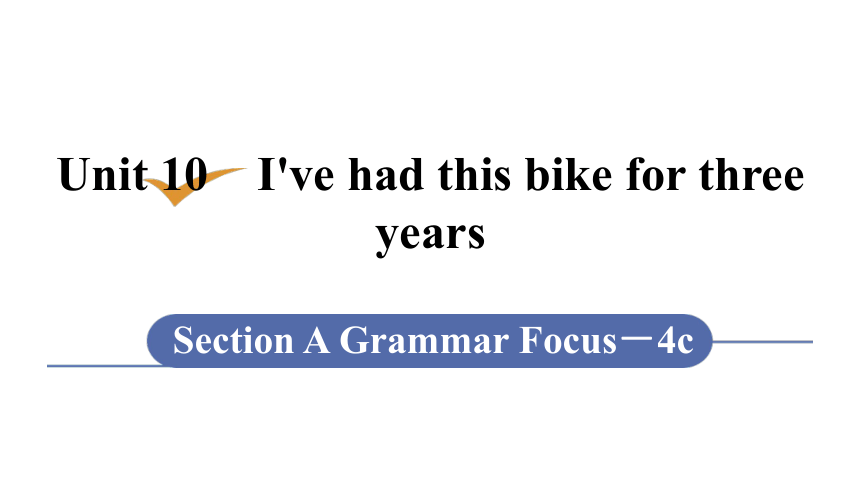 | |
| 格式 | ppt | ||
| 文件大小 | 812.5KB | ||
| 资源类型 | 教案 | ||
| 版本资源 | 人教新目标(Go for it)版 | ||
| 科目 | 英语 | ||
| 更新时间 | 2022-03-15 18:22:27 | ||
图片预览

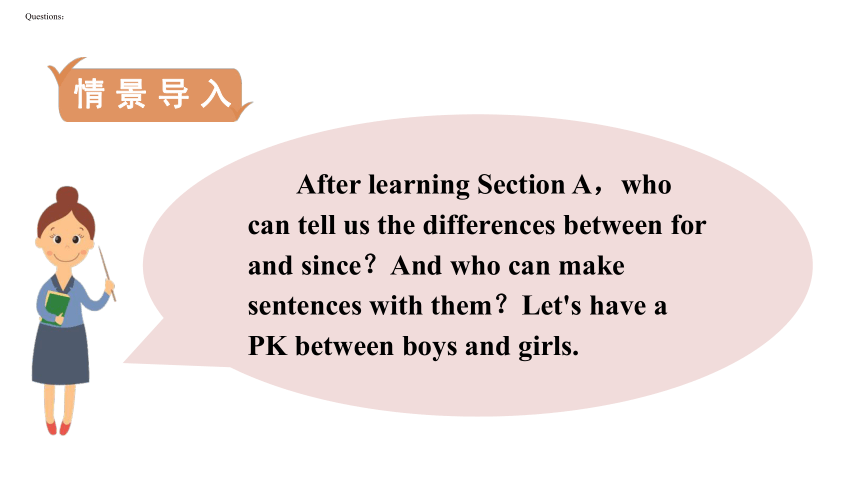
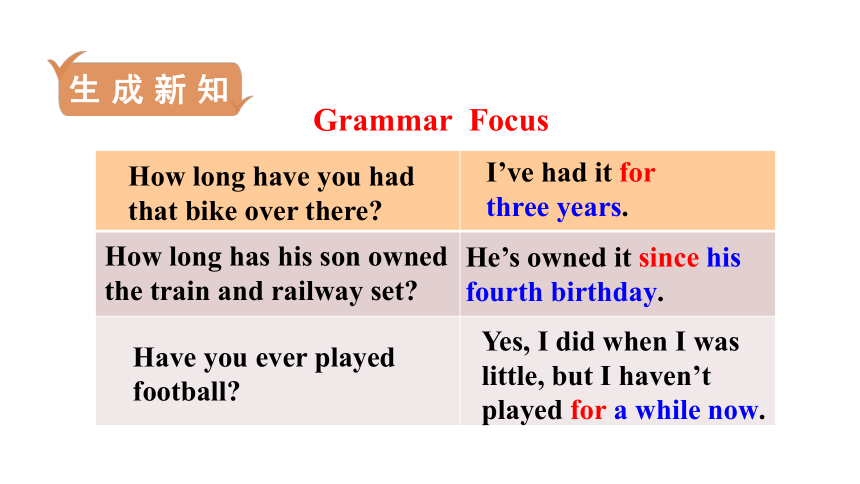
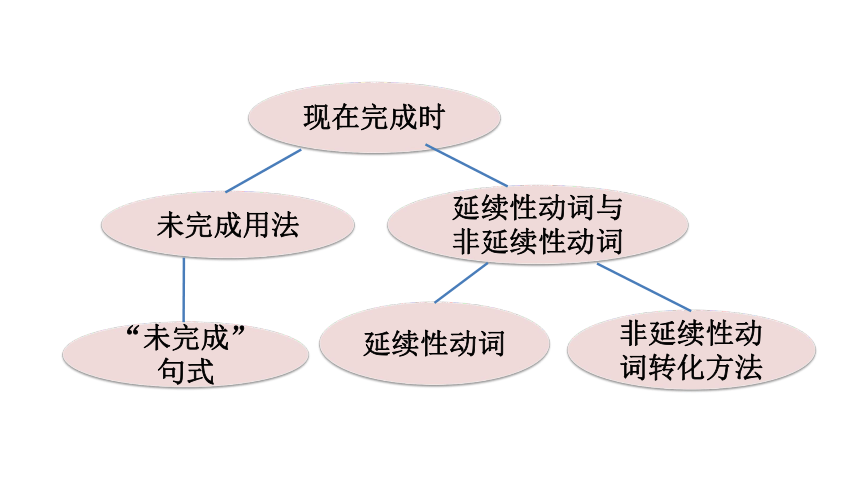
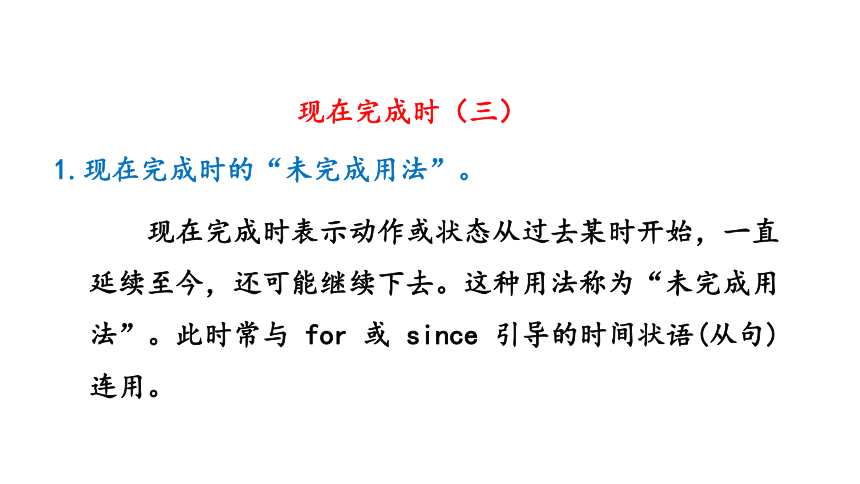
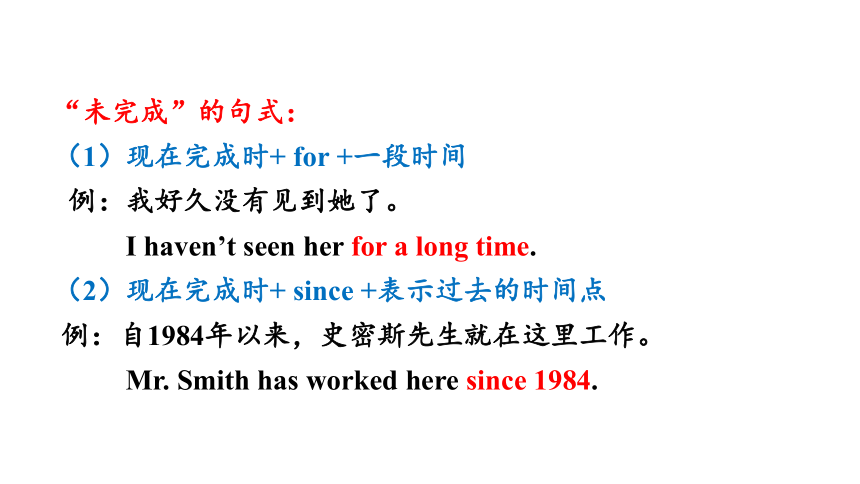

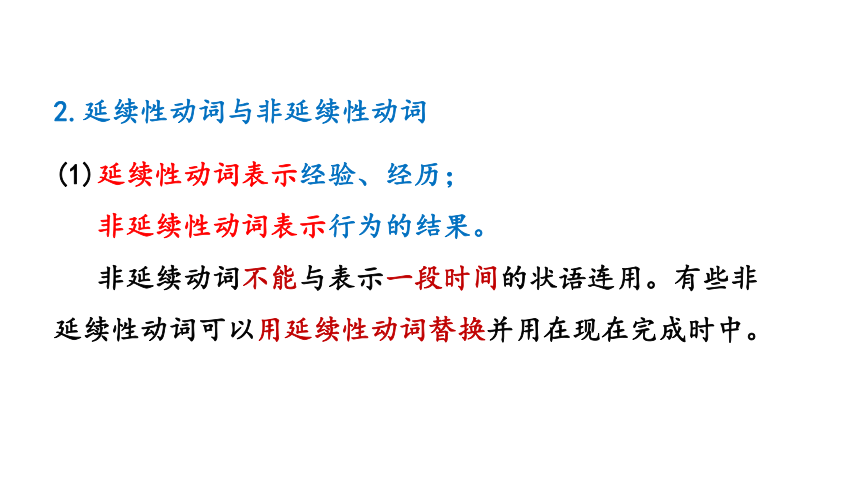
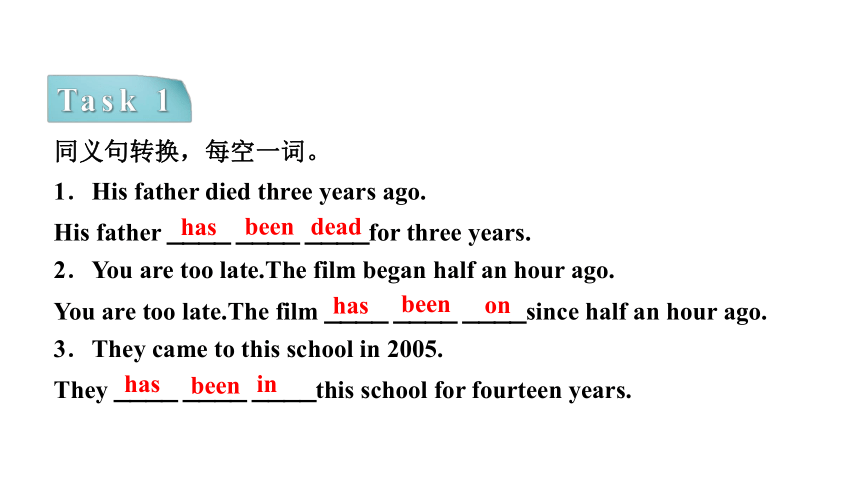
文档简介
(共26张PPT)
Unit 10 I've had this bike for three years
Section A Grammar Focus-4c
情景导入
Questions:
After learning Section A,who can tell us the differences between for and since?And who can make sentences with them?Let's have a PK between boys and girls.
生成新知
Grammar Focus
How long has his son owned the train and railway set
How long have you had that bike over there
I’ve had it for
three years.
Have you ever played football
He’s owned it since his fourth birthday.
Yes, I did when I was little, but I haven’t played for a while now.
现在完成时
未完成用法
“未完成”句式
延续性动词与非延续性动词
延续性动词
非延续性动词转化方法
现在完成时(三)
1.现在完成时的“未完成用法”。
现在完成时表示动作或状态从过去某时开始,一直延续至今,还可能继续下去。这种用法称为“未完成用法”。此时常与 for 或 since 引导的时间状语(从句)连用。
“未完成”的句式:
(1)现在完成时+ for +一段时间
例:我好久没有见到她了。
I haven’t seen her for a long time.
(2)现在完成时+ since +表示过去的时间点
例:自1984年以来,史密斯先生就在这里工作。
Mr. Smith has worked here since 1984.
(3)现在完成时+since+从句
例:自上大学以来他学了大约5000个英语单词。
He has learned about 5000 English words since
he went to college.
谓语动词用延续性动词,可以用how long提问。
2.延续性动词与非延续性动词
(1)延续性动词表示经验、经历;
非延续性动词表示行为的结果。
非延续动词不能与表示一段时间的状语连用。有些非延续性动词可以用延续性动词替换并用在现在完成时中。
Task 1
同义句转换,每空一词。
1.His father died three years ago.
His father ____ ____ ____for three years.
2.You are too late.The film began half an hour ago.
You are too late.The film ____ ____ ____since half an hour ago.
3.They came to this school in 2005.
They ____ ____ ____this school for fourteen years.
has
been
dead
has
been
on
has
been
in
4.Li Ming borrowed my dictionary the day before yesterday.
Li Ming ____ ____ my dictionary since two days ago.
5.Mary left the company in 2005.
Mary ____ ____ ____ ____ the company for fourteen years.
has
kept
has
been
away
from
Jim is in Japan. He arrived there three days ago.
__________________________________
2. They are very hungry. Their last meal was ten hours ago.
____________________________________
Rewrite the sentences using for or since.
Jim has been in Japan for three days.
They haven’t eaten for ten hours.
4a
3. I have a camera. I bought it in 2009.
_______________________________
4. I know Anna. I first met her three years ago.
___________________________________
5. Linda is ill. She became ill on Monday.
____________________________________
I have had a camera since 2009.
I have known Anna for three years.
Linda has been ill since Monday.
1. I __________________ (never be) to the water park before.
I want to ____ (go) next month before the weather gets too cold.
2. They_____________________ (never own) any pets, but
they ______________________ (always want) to have a dog.
Fill in the blanks with the correct forms of the verbs in brackets.
have never been
go
have never owned
have always wanted
4b
3. We__________ (have) a piano since last November.
We _________ (buy) it from the Li
family when they moved to the US last year.
4. Cathy and Amy _____________ (not be) back
to their hometown for two years. They ______ (miss) their
hometown a lot and hope to visit the place next year.
have had
bought
haven’t been
miss
5. This museum __________ (be) here for over 20 years.
It _____ (be) one of the oldest buildings in this small town.
is
has been
4c
Fill in the questions and ask two students. Then complete the chart.
1. Do you have a (n)_________ How long have you had it
2. Do you own a (n)__________ How long have you owned it
Things How long
Tony favorite book for two years
basketball since he was 10 years old
student 1
student 2
Summary
Words:
own v.拥有;有 owner n.主人
certain adj.某种;某事;某人
certainly adv.当然;行;肯定
truth n.事实;实情
truthful adj.诚实的;真实的
Phrases:
clear out 清理;丢掉
no longer 不再;不复
decide (not) to do sth. 决定(不)去某事
Sentences:
1. We have decided to each sell five things that
we no longer use.
2. Although he has not played with his old toys
for a long time, he still wanted to keep them.
3. My daughter was more understanding, although
she also felt sad to part with certain toys.
问题探究
短暂性(短语)动词与延续性(短语)动词及表示状态的短语之间的转化
1.有些短暂性(短语)动词可转化为相应的延续性(短语)动词。常见的有:
become → be
borrow → keep
buy → have/own
catch a cold → have a cold
come → stay
put on → wear
go to sleep → sleep
move to → live in
2.有些短暂性(短语)动词可转化为表示状态的短语。
常见的有:
leave → be away
begin/start → be on
die → be dead
finish → be over
join → be in/be a member of
fall asleep → be asleep
marry → be married
come/arrive here → be here
例句:1. I have a camera. I bought it in 2009.
我有一架照相机。我在2009年买的它。
=I have had a camera since 2009.
我从2009年开始就有一架照相机了。
2.I know Ann. I first met her three years ago.
我认识安。三年前我第一次见到她。
=I have known Ann for three years/since three years ago.
我认识安有三年的时间了/从三年前。
(2) no longer意为“不再;不复”,通常位于实义动词之前,助动词、情态动词或系动词之后。
它与not…any longer或not… any more同义。
例句:
He no longer lives here.
= He doesn't live here any longer/any more.
他不再住这里了。
She is no longer a child.
= She isn't a child any longer/any more.她不再是个孩子了。
随堂练习
【新词自查】
1.arrive in/at ___________________
=be in/at___________________
2.have _________________=buy _____________________
3.be/fall/become ill ____
4.water park _________
到达(非延续性动词)
到达(延续性动词)
买(延续性动词)
买(非延续性动词)
生病
水上乐园
5.get too cold __________
6.miss one's hometown __________
7.move to ______
8.since last November ____________________
变得太冷
思念故乡
搬到
自从去年十一月以来
Unit 10 I've had this bike for three years
Section A Grammar Focus-4c
情景导入
Questions:
After learning Section A,who can tell us the differences between for and since?And who can make sentences with them?Let's have a PK between boys and girls.
生成新知
Grammar Focus
How long has his son owned the train and railway set
How long have you had that bike over there
I’ve had it for
three years.
Have you ever played football
He’s owned it since his fourth birthday.
Yes, I did when I was little, but I haven’t played for a while now.
现在完成时
未完成用法
“未完成”句式
延续性动词与非延续性动词
延续性动词
非延续性动词转化方法
现在完成时(三)
1.现在完成时的“未完成用法”。
现在完成时表示动作或状态从过去某时开始,一直延续至今,还可能继续下去。这种用法称为“未完成用法”。此时常与 for 或 since 引导的时间状语(从句)连用。
“未完成”的句式:
(1)现在完成时+ for +一段时间
例:我好久没有见到她了。
I haven’t seen her for a long time.
(2)现在完成时+ since +表示过去的时间点
例:自1984年以来,史密斯先生就在这里工作。
Mr. Smith has worked here since 1984.
(3)现在完成时+since+从句
例:自上大学以来他学了大约5000个英语单词。
He has learned about 5000 English words since
he went to college.
谓语动词用延续性动词,可以用how long提问。
2.延续性动词与非延续性动词
(1)延续性动词表示经验、经历;
非延续性动词表示行为的结果。
非延续动词不能与表示一段时间的状语连用。有些非延续性动词可以用延续性动词替换并用在现在完成时中。
Task 1
同义句转换,每空一词。
1.His father died three years ago.
His father ____ ____ ____for three years.
2.You are too late.The film began half an hour ago.
You are too late.The film ____ ____ ____since half an hour ago.
3.They came to this school in 2005.
They ____ ____ ____this school for fourteen years.
has
been
dead
has
been
on
has
been
in
4.Li Ming borrowed my dictionary the day before yesterday.
Li Ming ____ ____ my dictionary since two days ago.
5.Mary left the company in 2005.
Mary ____ ____ ____ ____ the company for fourteen years.
has
kept
has
been
away
from
Jim is in Japan. He arrived there three days ago.
__________________________________
2. They are very hungry. Their last meal was ten hours ago.
____________________________________
Rewrite the sentences using for or since.
Jim has been in Japan for three days.
They haven’t eaten for ten hours.
4a
3. I have a camera. I bought it in 2009.
_______________________________
4. I know Anna. I first met her three years ago.
___________________________________
5. Linda is ill. She became ill on Monday.
____________________________________
I have had a camera since 2009.
I have known Anna for three years.
Linda has been ill since Monday.
1. I __________________ (never be) to the water park before.
I want to ____ (go) next month before the weather gets too cold.
2. They_____________________ (never own) any pets, but
they ______________________ (always want) to have a dog.
Fill in the blanks with the correct forms of the verbs in brackets.
have never been
go
have never owned
have always wanted
4b
3. We__________ (have) a piano since last November.
We _________ (buy) it from the Li
family when they moved to the US last year.
4. Cathy and Amy _____________ (not be) back
to their hometown for two years. They ______ (miss) their
hometown a lot and hope to visit the place next year.
have had
bought
haven’t been
miss
5. This museum __________ (be) here for over 20 years.
It _____ (be) one of the oldest buildings in this small town.
is
has been
4c
Fill in the questions and ask two students. Then complete the chart.
1. Do you have a (n)_________ How long have you had it
2. Do you own a (n)__________ How long have you owned it
Things How long
Tony favorite book for two years
basketball since he was 10 years old
student 1
student 2
Summary
Words:
own v.拥有;有 owner n.主人
certain adj.某种;某事;某人
certainly adv.当然;行;肯定
truth n.事实;实情
truthful adj.诚实的;真实的
Phrases:
clear out 清理;丢掉
no longer 不再;不复
decide (not) to do sth. 决定(不)去某事
Sentences:
1. We have decided to each sell five things that
we no longer use.
2. Although he has not played with his old toys
for a long time, he still wanted to keep them.
3. My daughter was more understanding, although
she also felt sad to part with certain toys.
问题探究
短暂性(短语)动词与延续性(短语)动词及表示状态的短语之间的转化
1.有些短暂性(短语)动词可转化为相应的延续性(短语)动词。常见的有:
become → be
borrow → keep
buy → have/own
catch a cold → have a cold
come → stay
put on → wear
go to sleep → sleep
move to → live in
2.有些短暂性(短语)动词可转化为表示状态的短语。
常见的有:
leave → be away
begin/start → be on
die → be dead
finish → be over
join → be in/be a member of
fall asleep → be asleep
marry → be married
come/arrive here → be here
例句:1. I have a camera. I bought it in 2009.
我有一架照相机。我在2009年买的它。
=I have had a camera since 2009.
我从2009年开始就有一架照相机了。
2.I know Ann. I first met her three years ago.
我认识安。三年前我第一次见到她。
=I have known Ann for three years/since three years ago.
我认识安有三年的时间了/从三年前。
(2) no longer意为“不再;不复”,通常位于实义动词之前,助动词、情态动词或系动词之后。
它与not…any longer或not… any more同义。
例句:
He no longer lives here.
= He doesn't live here any longer/any more.
他不再住这里了。
She is no longer a child.
= She isn't a child any longer/any more.她不再是个孩子了。
随堂练习
【新词自查】
1.arrive in/at ___________________
=be in/at___________________
2.have _________________=buy _____________________
3.be/fall/become ill ____
4.water park _________
到达(非延续性动词)
到达(延续性动词)
买(延续性动词)
买(非延续性动词)
生病
水上乐园
5.get too cold __________
6.miss one's hometown __________
7.move to ______
8.since last November ____________________
变得太冷
思念故乡
搬到
自从去年十一月以来
同课章节目录
- Unit 1 What's the matter?
- Section A
- Section B
- Unit 2 I'll help to clean up the city parks.
- Section A
- Section B
- Unit 3 Could you please clean your room?
- Section A
- Section B
- Unit 4 Why don't you talk to your parents?
- Section A
- Section B
- Unit 5 What were you doing when the rainstorm came
- Section A
- Section B
- Review of Units 1-5
- Unit 6 An old man tried to move the mountains.
- Section A
- Section B
- Unit 7 What's the highest mountain in the world?
- Section A
- Section B
- Unit 8 Have you read Treasure Island yet?
- Section A
- Section B
- Unit 9 Have you ever been to a museum?
- Section A
- Section B
- Unit 10 I've had this bike for three years.
- Section A
- Section B
